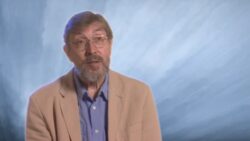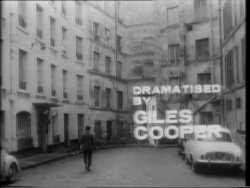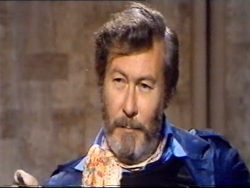by OLIVER WAKE
Peter Luke was a writer, story editor and producer on several of British television’s most influential drama anthology series, working at both ITV and the BBC, during a period of particular creative development for the medium. His television work was, however, only one part of a varied life.
Peter Ambrose Cyprian Luke was born on 12 August 1919, the son of British diplomatic Sir Harry Luke. The Luke family was originally of Hungarian descent (the name Lukach being Anglicised to Luke) and Luke’s upbringing was cosmopolitan. In his younger years he accompanied his parents on his father’s postings around the world, during which he learned about language, culture, art and literature, before returning to England to be enrolled at Eton. On completing his schooling with the minimum of academic rigour, Luke decided he wanted to become a painter and went to art school in London and then studied at the atelier of André Lhote in Paris. He enlisted in the British army shortly after the Second World War began, leading him to Egypt and combat on the first day of the second battle of El Alamein, in which he was wounded. After recovering he was deployed in the European theatre of war, serving in Italy, France and Germany. He was awarded the Military Cross for his actions in Normandy following D-Day. He ended the war a Major, acting Lieutenant-Colonel.
 Frank Cox, who died in April 2021 at the age of 80, was a television director and producer who worked on drama at the BBC and ITV across a period of more than forty years. Although his was never a household name, he was responsible for realising some of Britain’s most popular drama series and did much to boost the position of Scottish television drama.
Frank Cox, who died in April 2021 at the age of 80, was a television director and producer who worked on drama at the BBC and ITV across a period of more than forty years. Although his was never a household name, he was responsible for realising some of Britain’s most popular drama series and did much to boost the position of Scottish television drama.
 Giles Cooper is widely recognised as having been Britain’s greatest radio dramatist. He was highly prolific, writing dozens of original plays and adaptations for radio across a period of around 13 years. He was responsible for many of the medium’s masterpieces during the 1950s and his accomplishments were acknowledged posthumously with the BBC’s radio playwriting award being named in his honour. He also wrote for the stage, having particular success with his 1962 play Everything in the Garden, a dark comedy of middle-class suburban hypocrisy and greed.
Giles Cooper is widely recognised as having been Britain’s greatest radio dramatist. He was highly prolific, writing dozens of original plays and adaptations for radio across a period of around 13 years. He was responsible for many of the medium’s masterpieces during the 1950s and his accomplishments were acknowledged posthumously with the BBC’s radio playwriting award being named in his honour. He also wrote for the stage, having particular success with his 1962 play Everything in the Garden, a dark comedy of middle-class suburban hypocrisy and greed. 